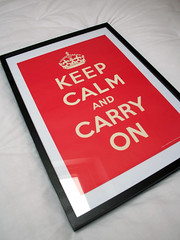 Image by scottroberts via Flickr
Image by scottroberts via Flickr
I have a t-shirt I'm fond of wearing with the now cult British wartime slogan Keep Calm and Carry On. I'm very fond of this particularly British message, but when is it appropriate? When do we buckle down and carry on as ever? When do we recognise that the world has changed and we need to change with it or get left behind?
It has been both invigorating and depressing to read a new report from JISC & Demos: The Edgeless University: why higher education must embrace technology. This is a pretty bleak wake-up call to HE in general and IT within HE in particular.
"British Universities have world-class reputations and they are vital to our social and economic future. But they are in a tight spot. The huge public investment that sustained much of the sector is in jeopardy and the current way of working is not sustainable. Some are predicting the end of the university as we have known it."
...that’s just the introduction!
Brian Kelly contributed to the report and highlighted the main themes on the UK Web Focus blog. He picks out one striking quote from a participant:
‘This seminar feels a bit like sitting with a group of record industry executives in 1999’.
Napster launched in 1999. It provided quick easy and illegal access to popular music in MP3. The record industry fought and squashed Napster, but other, impossible to control peer to peer filesharing services sprung up in its place.
Eventually legal music stores arrived, notably the iTunes Store in 2003. Rights holders were properly compensated, but the music was encumbered by DRM and wasn't portable between different MP3 players. Consumers were being asked to pay for a worse experience! It wasn't until 2008 - nearly 10 years later - that the industry finally licensed legal, DRM-free MP3 stores for the most popular content.
It's not just the music industry either. Newspapers are currently going through the same convulsions. They misunderstood the web - they thought that websites were an advert for their product, but it was their product. Now they are desperately struggling to find a new business model.
What about UK HE? As a culture we still don't get the networked economy, and are slow to understand the implications. Again from UK Web Focus:
To understand the implications of the edgeless university start with Brian Kelly, or better still read the original report (I've also ordered a paper copy which I'll leave in the Bristol Computer Centre staff room). Other good commentaries are from Sarah Bartlett on the Xiphos blog and Chris Sexton, director of Comupting Services at University of Sheffield.
I'll be following up soon with my take on this, starting with reference to another long-sighted Kelly - Kevin Kelly.




No comments:
Post a Comment